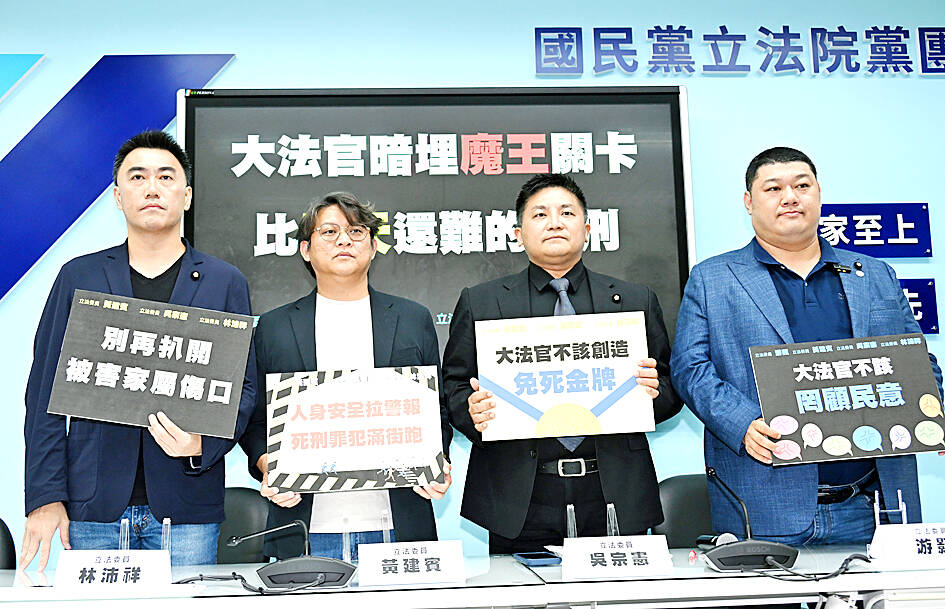The Chinese Nationalist Party (KMT) yesterday said it is mulling street protests and plebiscites to remove limits on capital punishment imposed last week by the Constitutional Court.
The Democratic Progressive Party (DPP) said that the KMT was inciting populism and vowed to draft legislation to bolster life imprisonment sentencing without parole and help prevent wrongful convictions.
The death penalty is allowed, but applies only to exceptionally heinous cases that have been tried according to the strictest possible due process standards, the Constitutional Court said in a constitutional interpretation on Friday last week.

Photo: Fang Pin-chao, Taipei Times
The court placed restrictions that made exercising capital punishment “virtually impossible” while ostensibly upholding the penalty, KMT Legislator Wu Tsung-hsien (吳宗憲), a former prosecutor, told a news conference at the Legislative Yuan in Taipei yesterday.
KMT lawmakers in the legislature and on the streets would fight to restore the “status quo” of the death penalty, Wu said, adding that they “do not rule out” proposing referendums to challenge the judgement.
People who are third parties to the tragedy of crime should not demand that the family members of people who have been murdered respect the rights of the perpetrator, he said.
The court’s restrictions on the death penalty shield perpetrators from justice and would contribute to social unrest, KMT Legislator Huang Chien-pin (黃建賓) said.
KMT Legislator Lin Pei-hsiang (林沛祥) said the Constitutional Court “showed hypocrisy” by neglecting the rights of people targeted by crime.
DPP Legislator Rosalia Wu (吳思瑤) later told a news conference that the KMT is “sowing populism and division for political gain.”
An average person would have understood the law enough to comply with a decision rendered by the nation’s highest court instead of making slanderous comments about its judges, she said.
The DDP caucus would amend laws to ensure constitutional standards are met in the justice system’s handling of cases and bring life imprisonment without parole out of near-dead status, she said.
Taiwan in 2009 ratified the International Covenant on Civil and Political Rights at the prompting of then-president Ma Ying-jeou (馬英九), DPP Legislator Tsai Yi-yu (蔡易餘) said.
The KMT had praised the court for upholding the punishment before slamming the judges for its de facto abolition in a circle of self-contradiction, Tsai said.
The opposition should play a constructive role in the legislative work of maintaining the justice system in light of the ruling and not use scare tactics on voters, he said.
“What is a referendum going to be about after the court ruled in favor of the death penalty?” he asked.

An essay competition jointly organized by a local writing society and a publisher affiliated with the Chinese Communist Party (CCP) might have contravened the Act Governing Relations Between the People of the Taiwan Area and the Mainland Area (臺灣地區與大陸地區人民關係條例), the Mainland Affairs Council (MAC) said on Thursday. “In this case, the partner organization is clearly an agency under the CCP’s Fujian Provincial Committee,” MAC Deputy Minister and spokesperson Liang Wen-chieh (梁文傑) said at a news briefing in Taipei. “It also involves bringing Taiwanese students to China with all-expenses-paid arrangements to attend award ceremonies and camps,” Liang said. Those two “characteristics” are typically sufficient

A magnitude 5.9 earthquake that struck about 33km off the coast of Hualien City was the "main shock" in a series of quakes in the area, with aftershocks expected over the next three days, the Central Weather Administration (CWA) said yesterday. Prior to the magnitude 5.9 quake shaking most of Taiwan at 6:53pm yesterday, six other earthquakes stronger than a magnitude of 4, starting with a magnitude 5.5 quake at 6:09pm, occurred in the area. CWA Seismological Center Director Wu Chien-fu (吳健富) confirmed that the quakes were all part of the same series and that the magnitude 5.5 temblor was

The brilliant blue waters, thick foliage and bucolic atmosphere on this seemingly idyllic archipelago deep in the Pacific Ocean belie the key role it now plays in a titanic geopolitical struggle. Palau is again on the front line as China, and the US and its allies prepare their forces in an intensifying contest for control over the Asia-Pacific region. The democratic nation of just 17,000 people hosts US-controlled airstrips and soon-to-be-completed radar installations that the US military describes as “critical” to monitoring vast swathes of water and airspace. It is also a key piece of the second island chain, a string of

The Central Weather Administration has issued a heat alert for southeastern Taiwan, warning of temperatures as high as 36°C today, while alerting some coastal areas of strong winds later in the day. Kaohsiung’s Neimen District (內門) and Pingtung County’s Neipu Township (內埔) are under an orange heat alert, which warns of temperatures as high as 36°C for three consecutive days, the CWA said, citing southwest winds. The heat would also extend to Tainan’s Nansi (楠西) and Yujing (玉井) districts, as well as Pingtung’s Gaoshu (高樹), Yanpu (鹽埔) and Majia (瑪家) townships, it said, forecasting highs of up to 36°C in those areas